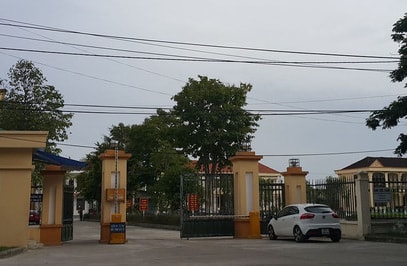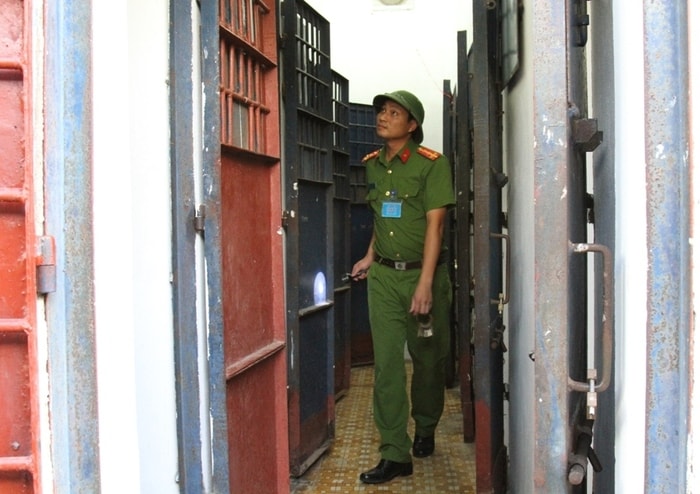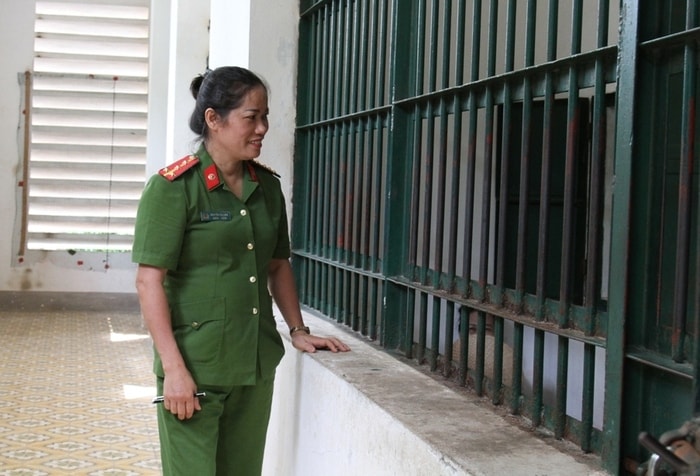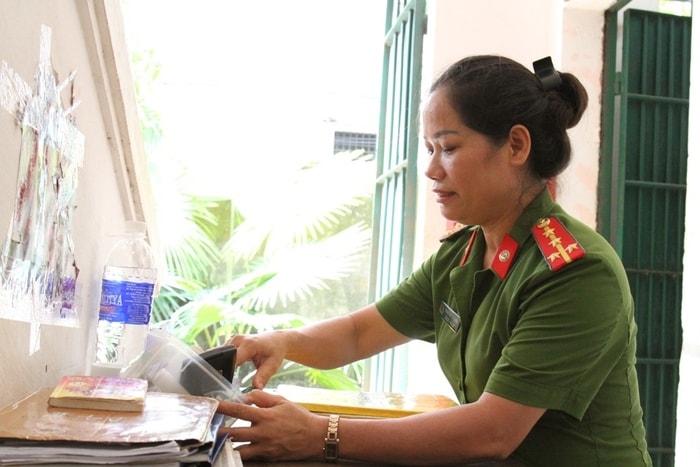"Chilling" to hear the story of guarding death row inmates
(Baonghean.vn) - Death row inmates are criminals sentenced to death - they are counting down the days until their execution. The story of taking care of these prisoners makes listeners "chill".
Prison officers tasked with looking after death row inmates not only have to ensure absolute safety, but they also have to regularly talk to and understand the psychological and ideological developments of death row inmates in order to have appropriate therapy and countermeasures.
A day in the life of a death row warden
At the Nghe An Provincial Police Detention Center on a day at the end of September, the prison officers in general and the prison officers in charge of guarding death row inmates in solitary confinement seemed to be more vigilant since the incident of two death row inmates escaping from the T16 Detention Center of the Hanoi City Police.
 |
| Nghe An Provincial Police Detention Camp. Photo: Ha Thu |
Up to now, the work of guarding death row inmates has always been strictly implemented. Because this place has the largest number of death row inmates in the country with 32 subjects. Along with that, the solitary confinement system in the Detention Center has degraded, there are people who have been sentenced to death for more than 10 years but have not yet been executed.
Captain Nguyen Viet Hung, who was assigned to guard the B2 solitary confinement cell, with 16 death row inmates, said: A day for prison guards is counted from the time they go to each solitary confinement cell, wake up the death row inmates to check the safety of the people and the cell. Then, twice a day, they are responsible for removing the shackles for 15 minutes each time so that the death row inmates can bathe, do personal hygiene, and go out of the cell to exercise.
Every day, when in contact with prisoners who are counting down the days waiting to board the "boat to hell", prison officers always have to ask and encourage them about their psychology and health status to grasp their thoughts and promptly notify the medical department when there are bad developments in the death row inmates' health.
Of the 16 death row inmates under Captain Hung’s care, the one with the longest tenure in chains is Tran Dinh Phi (born in 1976), residing in Na Toc village, Que Son commune, Que Phong district. Phi is the leader of a drug ring from Laos, organizing the purchase and sale of 59 heroin cakes 8 times. Sentenced to death in 2006, this death row inmate has been in solitary confinement for 11 years.
 |
| Captain Nguyen Viet Hung is checking the safety of solitary confinement cells. Photo: Ha Thu |
Or death row inmate Truong Van Quang (born 1985), residing in Chau Tien commune, Quy Hop district, was sentenced to death in September 2016 after causing the death of Mr. Nathusingh Solanki (Indian nationality). Since being put in solitary confinement, death row inmate Quang has been mentally unstable and pessimistic because he has late-stage HIV and was sentenced to death, so he asked the officers to allow him to write a petition to be executed early.
Also in this solitary confinement area, there are many high-profile death row inmates such as Phan Thanh Ton, Vu Duc Manh, Vu Thanh Trung... Most of these are drug convicts, with relatively long periods of time in chains, so Captain Hung's duties and pressure are quite heavy, having to meet and talk every day to grasp the psychology and thoughts in order to provide appropriate sedative therapy for each death row inmate.
Light at the end of the tunnel
Captain Nguyen Thi Lien, who has over 30 years of experience as a prison guard, including many years guarding death row inmates, shared: She herself cannot remember how many death row inmates she has "sent" to the execution ground, but through the process of interacting with these people, she realized one thing: when facing death, everyone strangely wants to live. And they are truly tormented, regretful, and remorseful for what they have done.
Of course, any regret is too late, but it is a remarkable psychological change, after all that this person has caused to their family, society and themselves.
Three of the four female death row inmates currently under the care of Captain Lien are sisters-in-law, and were part of a drug ring that bought, sold, and transported up to 225 heroin bricks. They are Nguyen Hoai Thu, Nong Thi Han, Nguyen Thi Chau, and Truong Thi Hue. What is special is that all four of these female death row inmates suffer from high blood pressure and have written many petitions to the President asking for clemency.
 |
| Captain Nguyen Thi Lien asks and cares for prisoners being detained. Photo: Ha Thu |
From Ha Tinh to teach at Tien Phong Secondary School, Que Phong District, blinded by money, Nguyen Hoai Thu was drawn into a trans-Vietnam drug ring, even dragging her two sisters-in-law to death's door. From solitary confinement, Thu used the deposit money to subscribe to newspapers and through this medium, the female death row inmate learned about and sympathized with the difficult circumstances in society.
With the remaining love of a teacher for children, Thu spent 3 times on depositing money to help 2 especially difficult circumstances. Among them, Nguyen Dang Hung, an orphan in hamlet 8, Nhan Son commune, Do Luong district, was sent by Thu to help twice, each time 1 million VND and most recently, also through mass media, Nguyen Hoai Thu sent money to help Lo Thi Kim Oanh (10 years old), an orphan in Giang hamlet, Nghia Thai commune (Tan Ky).
According to Captain Nguyen Thi Lien, Nguyen Hoai Thu was very depressed when she was first put in chains. She was determined that she would die sooner or later, so she went on a hunger strike for a whole week. The officers had to encourage and analyze this female prisoner for a long time before she could regain her mental balance.
Another case is that of death row inmate Lu Thi Minh, from Tam Quang commune, Tuong Duong district. While working as a district official, she was sent to study part-time at Vinh University. Confused by love, Minh was taken advantage of and became a drug trafficker. More painfully, Minh dragged her younger brother, who was also a student at the time, into crime. The bitter ending was that Minh was sentenced to death, and her younger brother was sentenced to 20 years in prison.
Luck smiled on the fate of prisoner Lu Thi Minh after more than 2 years in chains, from the petition for clemency sent to the President, when considering the family background of a revolutionary family, Minh's biological father was a seriously wounded soldier, a former prisoner of Phu Quoc, so the sentence was commuted to life imprisonment, currently serving at Dong Son Prison (Quang Binh).
The most difficult thing for prison guards to do when looking after death row inmates is probably the sick and ill ones. Being sentenced to death, and constantly suffering from illness, they no longer have the will to live and always resist. In these cases, how to ensure the health of the death row inmates while ensuring absolute safety during the treatment process is always the biggest headache for prison guards.
 |
| Captain Nguyen Thi Lien, a prison officer in charge of death row inmates at Nghe An Police Detention Center. Photo: Ha Thu |
Death row inmate Nguyen Trong Tuan (born 1975), residing in Khanh Son 2 commune, Nam Dan district (Nghe An), who was sentenced to death in 2013, is infected with HIV. A few months ago, Tuan was mentally agitated, cursing, throwing objects, and screaming day and night, so he had to be transferred to the detention center's infirmary for treatment, from May 2017 until now. Captain Tran Trong Phu, who was assigned to guard Tuan, instead of working in solitary confinement, had to move to the unit's infirmary to supervise, monitor, and guard this death row inmate.
Major Nguyen Cong Dung - Deputy Warden of the Provincial Police Detention Center said: Currently, the detention cells have been equipped with security cameras for monitoring, but in times of problems such as power outages or storms, prison officers still have to patrol regularly to make sure that no problems occur.
However, with their responsibility, those in charge of guarding death row inmates at the Provincial Police Detention Center still fulfill their responsibilities, both stabilizing the psychology of death row inmates and ensuring absolute safety of the detention environment in the detention center./.
Ha Thu

